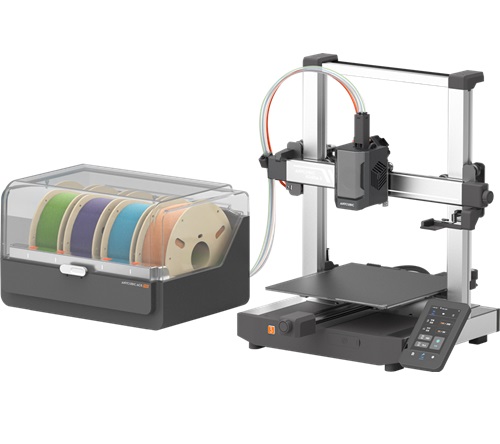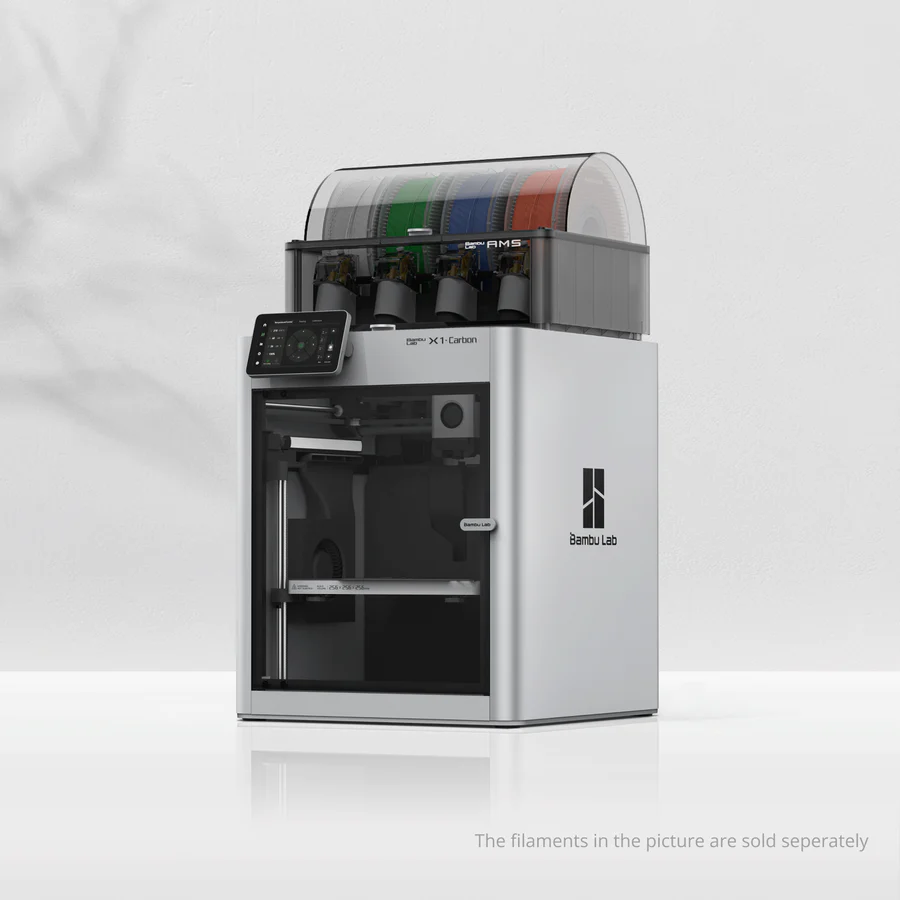Compare Kobra 3 Combo vs X1 carbon
Comparison between the best 3D printers
Choose the best 3D printer at the best price. The cheapest 3D printers are here.
Buy a 3D printer here with 3D Fila.
 |
 |
|
| Model | Kobra 3 Combo[BUY Kobra 3 Combo] |
X1 carbon |
| Printing Material | Filament | Filament |
| Buy Filament for Anycubic Kobra 3 Combo | Buy Filament forBambu Lab X1 carbon | |
| Estimated price | $349,00 | $1449,00 |
| Manufacturer | Anycubic | Bambu Lab |
| Release Year | 2024 | 2023 |
| Print Volume [mm] | 250x250x260 | 256x256x256 |
| Printer Size [mm] | 452x504x483 | 389x389x457 |
| Weight [kg] | 9,2 | 14,13 |
| Power Loss Recovery | YES | YES |
| Enclosed printer | NO | YES |
| Bed Leveling | Automatic | Automatic |
| Filament End Sensor | YES | YES |
| Bed type | Heated | Heated |
| Power supply system | Direct Drive | Direct Drive |
| Standard nozzle | 0,4 | 0,4 |
| Maximum Nozzle Temperature [°C] | 300 | 300 |
| Maximum Bed Temperature [°C] | 110 | 120 |
| Maximum printing speed [mm/s] | 600 | 500 |
| Filament holder | YES | YES |
| Camera for supervision | NO | NO |
| Recommended filaments | PLA, PETG, ABS, PP, HIPS | PLA, PETG, TPU, PVA, PA, PA-CF, Nylon, PC |
| Recommended slicers | Anycubic Slicer, Cura, Orca Slicer | Bambu Studio, Super Slicer, Cura, Prusa Slicer, Orca |
| Maximum Resolution [mm] | 0,1 | 0,1 |
| Processor | 32 bits | Quad ARM A7 1.2 GHz |
| Display | Touchscreen 4,3'' | Touchscreen 5'' |
| Power Supply | 400 W | 350 W |
| Connectivity | USB, Wi-Fi, Cloud | Wifi, Bambu bus, Cartão SD |
| Operating systems | Windows, Linux, Macbook | Windows, Linux, Macbook |
| Date of registration in the system | 2024-06-27 | 2024-04-10 |
| Release date | 2024 | 2023 |
| Extra features | The Anycubic Kobra 3 Combo offers advanced features, including multi-filament printing with the ACE (Anycubic Color Engine) system, allowing for quick switching of up to four filaments. It features automatic bed leveling, nozzle clogging detection, and integrated filament drying during printing. The printer supports technical materials such as ABS, ASA, Nylon, and PC, thanks to the hotend that reaches 300°C and the heated bed up to 110°C. In addition, it has a 4.3-inch touchscreen and compatibility with various slicers such as Anycubic Slicer, Cura, and Orca Slicer. | The Bambu Lab X1 Carbon revolutionizes 3D printing with stunning design, high print speeds, and a streamlined user experience. It stands out with its CoreXY system, a hotend capable of reaching 300°C, allowing for a wide range of filaments. Its LiDAR-assisted bed leveling system, vibration compensation, and AMS multicolor printing capability raise the industry standard. Print quality is impressive, with the ability to fine-tune for perfection. The X1 Carbon, with its closed build volume, not only promises but also delivers one of the most advanced 3D printing experiences available to consumers. |
| Support for multiple colors and materials (AMS and CFS) | YES | YES |
Notes * |
||
| Cost-benefit | 8 / 10 | 7 / 10 |
| Hardware | 4 / 10 | 5.6 / 10 |
| Tela | . | . |
| Print volume | 4 / 10 | 4 / 10 |
| Performance | 5 / 10 | 4 / 10 |
| [BUY Kobra 3 Combo] |
Conclusion |
| In comparing the Anycubic Kobra 3 Combo and the Bambu Lab X1 Carbon, it's clear that both printers cater to different user needs and priorities. The Kobra 3 Combo emerges as a cost-effective option, offering a robust feature set at an accessible price point, making it a great choice for hobbyists and those new to 3D printing. Its capabilities, such as multi-filament printing and a heated bed, enhance versatility without compromising ease of use. Conversely, the X1 Carbon stands out with its premium features, advanced technology, and higher price. It is better suited for professionals or serious enthusiasts who require superior print quality, rapid speeds, and a range of advanced capabilities, such as LiDAR-assisted bed leveling and vibration compensation. This printer provides a comprehensive printing experience, especially for those looking to push the boundaries of 3D printing materials and techniques. Ultimately, the Kobra 3 Combo is commendable for its excellent cost-benefit ratio and solid performance, making it ideal for those on a budget. The Bambu Lab X1 Carbon, while more expensive, justifies its cost through enhanced hardware, user experience, and advanced features designed for demanding projects. The choice between them boils down to individual needs, budget, and the level of sophistication desired in 3D printing. |

